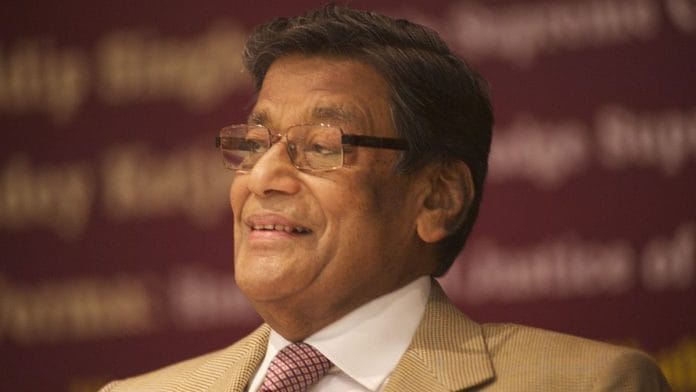The apex court refused to stay BJP leader B.S. Yeddyurappa’s swearing-in ceremony early Thursday but not before a 12-hour long drama unfolded.
New Delhi: Attorney general K.K. Venugopal: “Anti-defection law would come into force only after the MLAs are sworn in.”
Justices A.K. Sikri and Ashok Bhushan: “Does that mean all the suitcase exchange is possible before they are sworn in? That’s impermissible.”
The acerbic comments were exchanged during a three-hour long hearing by a three-judge Supreme Court bench led by Justice A.K. Sikri as Congress sought a stay on Karnataka governor Vajubhai Vala’s decision to invite BJP leader B.S. Yeddyurappa to form the government.
The apex court refused to stay Yeddyurappa’s swearing-in ceremony early Thursday despite the last ditch appeal by the Congress which resulted in a post-midnight hearing lasting until the early hours of the morning.
In the run up to newly inducted Karnataka chief minister Yeddyurappa’s swearing-in ceremony at 9 am Thursday, the 12 hour-long drama started late Wednesday when it was apparent that Congress would make its way to Chief Justice of India Dipak Misra’s official residence to mention an urgent matter.
A few hours later, by midnight, it was known that Congress had managed to successfully file a petition – the Supreme Court registry opened after hours to admit the appeal, and secretary general Ravinder Maithani was on his way to CJI Misra’s residence for further instructions.
By 1:15 am, the swelling crowd outside the CJI’s residence had shifted to the Supreme Court that wore a deserted look, as it should at that hour. However, court number six where the hearing took place was a beehive of activity. The skeletal staff that was specially roused in the middle of the night to get the apex court functioning for the hearing was milling about trying to make arrangements in time for the hearing to begin shortly.
Two court masters – those who lived the closest to the apex court were brought in to help facilitate the proceedings. Incidentally, the duo which answered the call were not new to post-midnight proceedings; they were also present in July 2015, when the SC opened its doors at 3 am to hear a final plea seeking a stay on the planned execution of Yakub Memon.
Senior advocate Abhishek Manu Singhvi, representing the Congress was present as was Attorney General K.K. Venugopal – for Vala and the Centre, senior advocate Mukul Rohatgi – who was believed to be representing Yeddyurappa, actually argued for as yet unnamed MLAs who saw the news on TV and instructed him to appear in court, and Additional Solicitor General (ASG) Tushar Mehta.
Throughout the hearing, Singhvi, who took the longest time to put forth his points, remained sharp while it was apparent that octogenarian Venugopal was fatigued having been woken up from his sleep.
Defending the governor’s move, Venugopal argued that anti-defection law would come into force only after the MLAs are sworn in. To this, Justices A.K. Sikri and Ashok Bhushan said: “Does that mean all the suitcase exchange is possible before they are sworn in? That’s impermissible.”
“Sorry we woke you up. This is not a case that deserves a midnight hearing,” Rohatgi was heard saying several times during the course of the night. “Are heavens falling if the swearing in takes place?” he said throughout the night. “I got a call when I was sleeping. Some two MLAs saw it on TV and called me. Is this Yakub Memon situation? It should have never been heard at midnight,” Rohatgi said.
Here, Singhvi was quick to argue that by comparing the urgent hearing to that of the Memon hearing, Rohatgi was attempting to trivialise the situation. “Highest form of trivialisation to compare this to the hanging,” Singhvi said.
He further argued, “Arithmetically it is not possible for the BJP to prove majority.” Justice Bobde responded by saying: “Assuming static loyalty of MLAs.” To which Singhvi said: “I am assuming dynamic and moving loyalty also but let us test that first now.”
The focus of Rohatgi’s argument circled around the apex court’s inability to order an injunction against the governor’s orders that is seen as discharging a constitutional duty.
Drawn faces – from the exhaustion of the day and the odd hour — were seen on almost everyone attended the hearing. Between sips of hot tea, the judges too battled fatigue to pay attention to the arguments made.
It seemed the tea helped since Justices Sikri and S.A. Bobde peppered Singhvi and Rohatgi with questions to understand the finer points of law while Justice Bhushan largely observed.
Though sharply dressed considering the hour, the staff members helping the judges were all but slouching in their chairs trying their best to stay alert and awake. The courtroom, packed to the rafters, was stifling since the air conditioning was off.
At one point, two hours into the hearing, the judges made a move to get up, having made their intentions known. They were not going to defer the swearing in ceremony. However, Singhvi, alert till the end, made a strong plea for his right to rebut contentions made by Rohatgi, succeeding in persuading the bench to continue hearing the matter.
When Singhvi and Rohatgi indulged in unpleasant exchanges, Sikri asked them to stop immediately. “I am allergic to this type of exchange,” he remarked.
The order lists 26 advocates representing various interests. However, the entire discourse was limited to the bench, Singhvi, Venugopal and Rohatgi.
Despite the rushed arrangements and the late hour, the courtroom was packed with lawyers who simply wished to attend the proceedings. A surprising and wholly unprecedented outcome of the hearing was the ability of journalists to tweet the proceedings live.
The hearing finally ended at 5:30 am with Congress losing the appeal. The crowd that had entered the court in the dead of the night emerged to the first rays of light.






